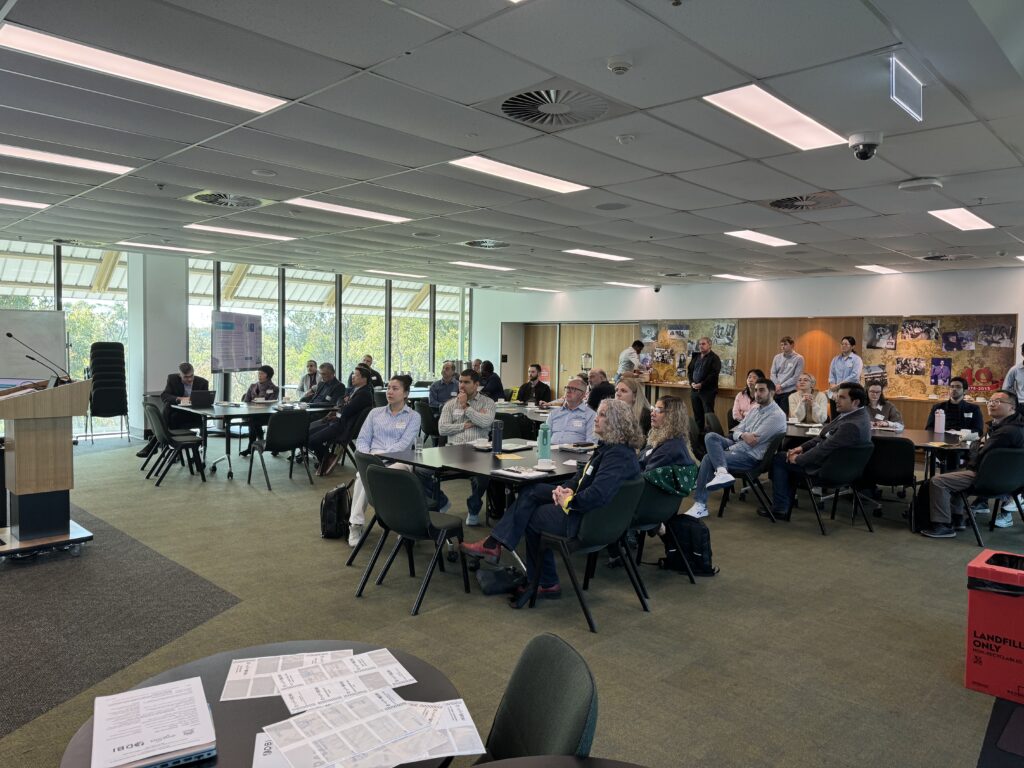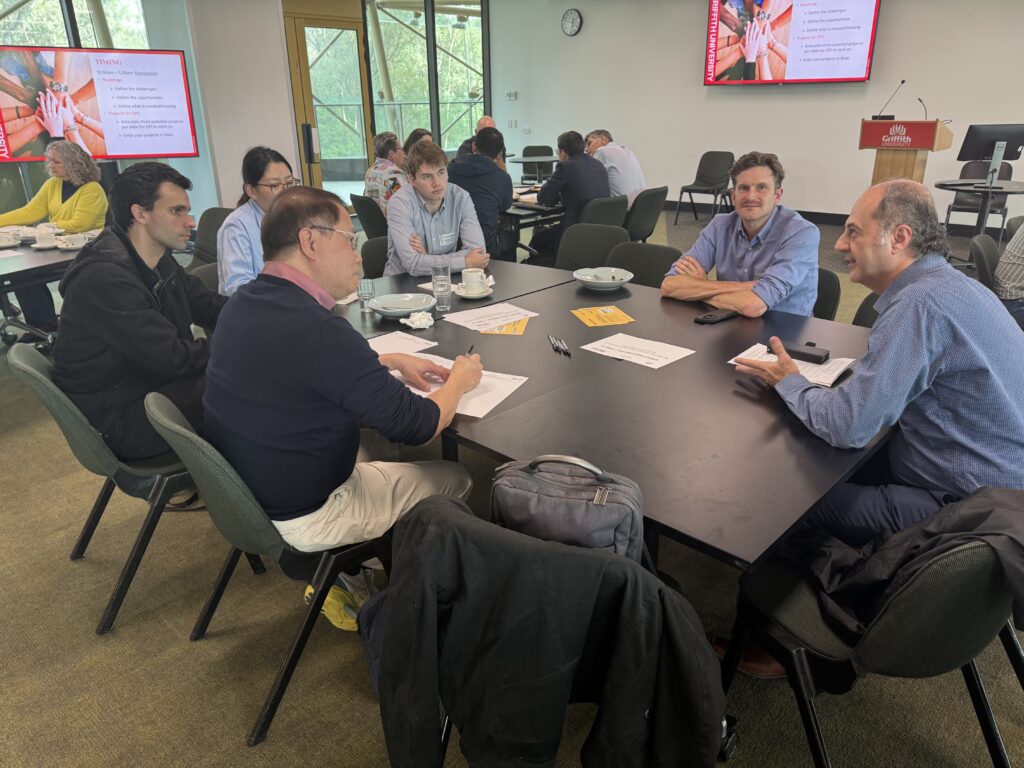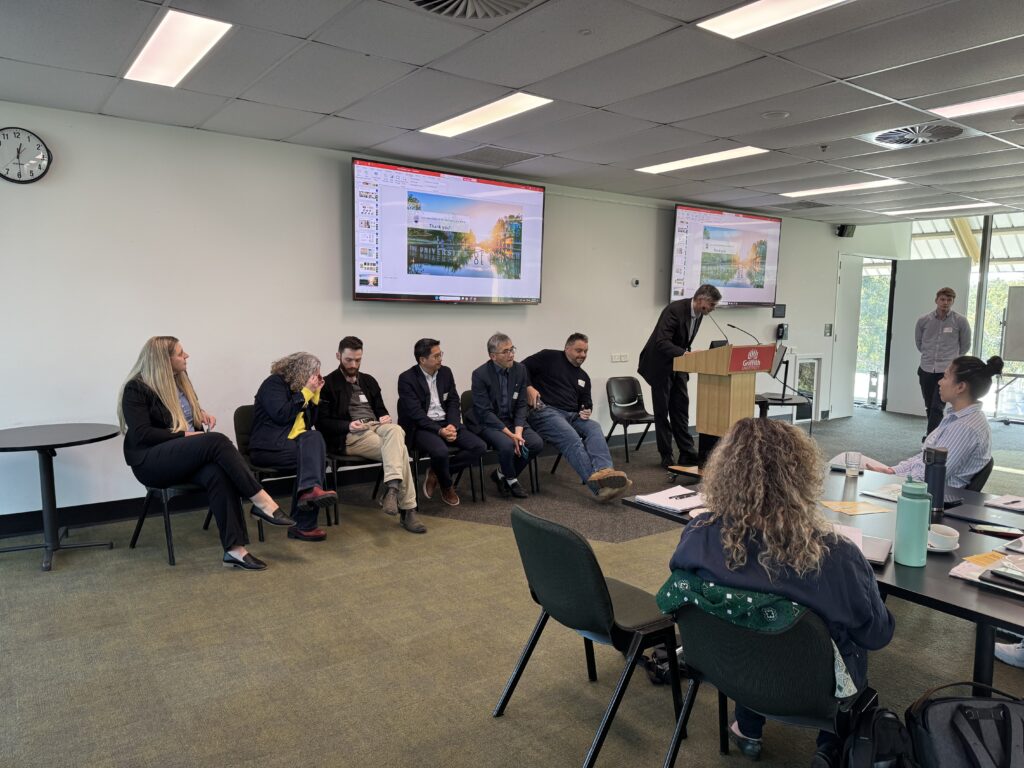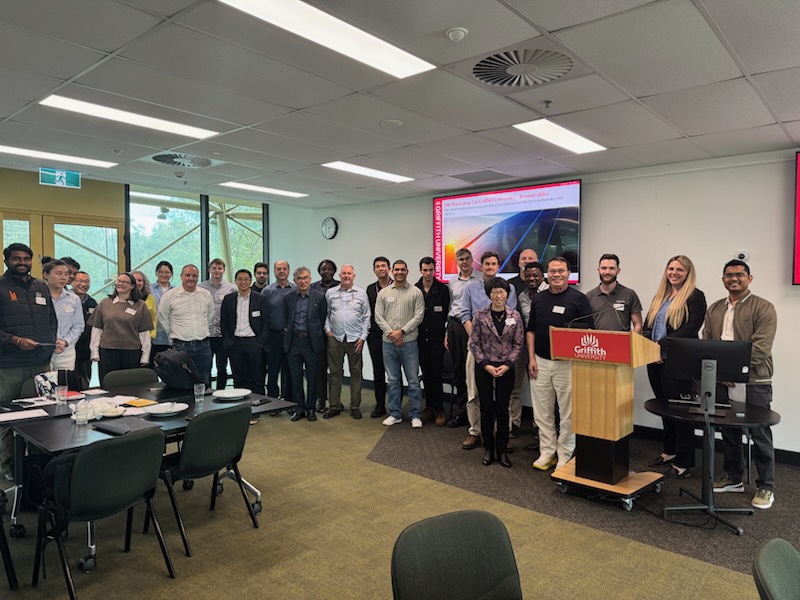On 27 June 2025, Griffith University hosted the second in a series of workshops organised by the Decarbonising the Building Industry (DBI) network. Held at the Nathan Campus in Brisbane, the event focused on “The role of wood products in decarbonising the construction industry”. In partnership with the Engineered Wood Products Association of Australasia (EWPAA), the workshop brought together experts from academia, industry, and government to discuss innovations in timber use, share project outcomes, and plan future initiatives. Attendees included DBI members, industry leaders, and international delegates from the World Conference on Timber Engineering.

The workshop opened with welcomes from Professor Hong Guan and Professor Benoit Gilbert of Griffith University, who highlighted the institution’s commitment to environmental goals, including achieving net zero carbon emissions by 2029. Professor Guan noted Griffith’s ranking in global sustainability assessments and its research focus on timber structures for decarbonisation. Professor Tuan Ngo, DBI’s lead convener from the University of Melbourne, provided an overview of the network’s mission. Professor Ngo emphasised DBI’s role in fostering international collaboration on clean energy and decarbonisation, mentioning recent workshops and upcoming events like a conference on digital technologies.

Mr Harrison Brooke on the EWPAA’s role and activities
Harrison Brooke, Technical Manager at the EWPAA, outlined the association’s history since 1934 and its representation of manufacturers across Australia, New Zealand, Papua New Guinea, and Fiji. Mr Brooke stressed the importance of product certification, standards development, and bridging research with industry needs. He highlighted challenges like urban sprawl affecting manufacturing sites and opportunities in circular economy practices, such as using recycled timber in particleboard and biofuels.
Ms Rhianna Robinson on outcomes from previous DBI projects
Rhianna Robinson, Research Scientist at the Queensland Department of Primary Industries, presented results from two projects selected at the prior workshop. The first addressed challenges in reutilising engineered wood products and treated wood waste, identifying barriers in technical, regulatory, economic, and environmental areas. The second investigated embodied carbon calculation methods for timber, recommending consistent approaches like the ISO 14067 standard to ensure accurate comparisons with other materials.
Mr Gavin Matthew on EWPAA initiatives
Gavin Matthew, representing the EWPAA, contributed to discussions on industry collaboration, aligning closely with Mr Brooke’s emphasis on certification and research alignment. Mr Matthew underscored the need for ongoing communication between researchers and manufacturers to address knowledge gaps and promote timber’s carbon storage benefits.
Dr Penelope Mitchell on timber circularity and waste recycling
Dr Penelope Mitchell from the National Centre for Timber Durability and Design Life explored wood waste recycling in Queensland. Dr Mitchell detailed a project aiming to divert 1.2 million tonnes of wood waste annually from landfills through pilots in pyrolysis, gasification, and biochar production. She highlighted regulatory hurdles, like end-of-waste codes, and the potential for creating jobs while reducing emissions, noting collaborations with waste companies for scalable solutions.
Mr Joseph Carther on resource trends in softwood processing
Joseph Carther from Associated Kiln Driers Pty Ltd discussed trends in Australia’s softwood resource, warning of declining fibre quality due to younger plantations and reduced rotation ages. Mr Carther advocated for optimising land use to balance structural timber needs with other demands, such as bioenergy. He emphasised whole-of-log utilisation and the economic pressures on processors, calling for incentives to support lower-carbon materials.
Associate Professor Minghao Li on Canadian approaches to timber in construction
Associate Professor Minghao Li from the University of British Columbia shared insights from Canada’s efforts, focusing on British Columbia’s mass timber action plan and wood-first policy. Associate Professor Li described UBC’s climate action plan targeting net zero by 2035, with examples like the 18-storey Brock Commons Tallwood House. He discussed modular prefabrication to address housing shortages, wood waste recycling initiatives, and research on converting waste into engineered products, stressing low-carbon materials and supply chain reliability.
Panel discussion and Q&A
Following the presentations, a lively Q&A session, moderated by Professor Gilbert, involved all speakers. Questions from in-person and online attendees covered electrifying logistics in manufacturing (not yet widespread due to costs), biochar from wood waste (pilots underway but facing regulations), and compulsory carbon reporting (viewed more as a compliance burden than an opportunity). Discussions highlighted hybrid buildings, recycling challenges in demolition (timber often landfilled unlike concrete or steel), and the need for incentives over regulations. International parallels emerged, with Canada facing similar fibre quality and housing issues.

Key takeaways
Timber’s potential for carbon storage is significant, but challenges in resource quality, waste management, and regulations require collaborative solutions.
Consistent embodied carbon calculations and end-of-waste frameworks are critical for fair material comparisons and advancing circular economy goals.
Incentives, rather than mandates, could drive adoption of low-carbon practices, alongside innovations like modular construction and waste-to-product technologies.
Canada’s policy successes, such as wood-first initiatives, offer models for Australia to consider.

This DBI workshop built on last year’s focus on forests, advancing discussions toward a timber roadmap for decarbonisation. Attendees voted on new projects for the Queensland Department of Primary Industries, ensuring actionable outcomes. With engaging presentations and networking over lunch, the event reinforced DBI’s collaborative spirit. Future workshops will explore buildings and supply chains, continuing the push for a greener construction sector.

